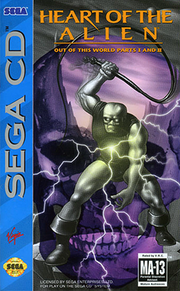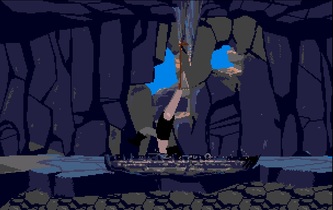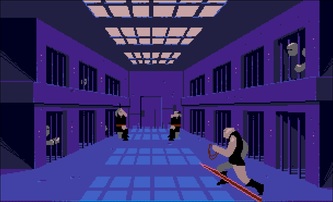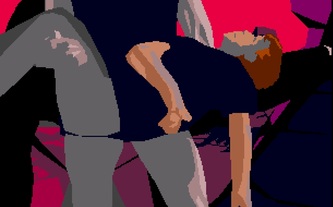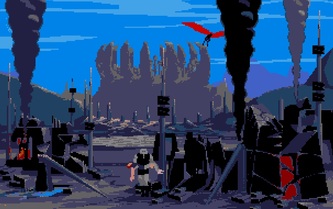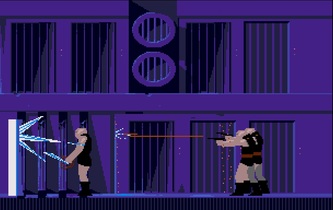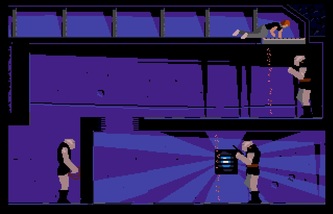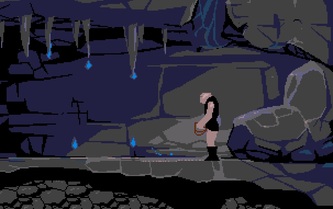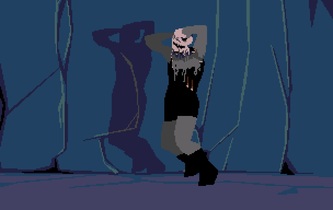HEART OF THE ALIEN (SCD)
Between pioneering rotoscope visuals, a rich soundtrack and masochistically difficult, intelligent gameplay,
it’s easy to see why Another World (Out of this World in the US) is still held in such reverence among
gamers (and developers) who remember the impact it had in the early nineties. It was a
sci-fi adventure blessed with oodles of atmosphere, and a mature gravitas that
was missing from its more colourful counterparts of the 16-bit era.
Its 1994 sequel Heart of the Alien slipped under the radar. Exclusivity to the Mega-CD format meant its retail reach was limited at best, whilst a switch of developer and minimal input from series creator Eric Chahi (barring the suggestion of a controversial story event) may also have dampened expectations. A shame, as it does no disservice to the original.
HOTA sees an immediate continuation of Another World’s storyline with the player this time controlling the marooned scientist Lester Chaykin’s alien accomplice, Buddy. As slavers destroy his village, Buddy and the injured Lester are temporarily separated, and it’s the alien’s task to battle the odds and rescue those who’ve been incarcerated in a slave prison. As before, it’s a mixture of 2D platforming, shooting and problem-solving. Retaining both the bleakly beautiful dystopian setting and uncompromising, die-at-any-moment school of gameplay that made its predecessor so engrossing, Heart of the Alien makes for a familiar but absorbing quest.
Its 1994 sequel Heart of the Alien slipped under the radar. Exclusivity to the Mega-CD format meant its retail reach was limited at best, whilst a switch of developer and minimal input from series creator Eric Chahi (barring the suggestion of a controversial story event) may also have dampened expectations. A shame, as it does no disservice to the original.
HOTA sees an immediate continuation of Another World’s storyline with the player this time controlling the marooned scientist Lester Chaykin’s alien accomplice, Buddy. As slavers destroy his village, Buddy and the injured Lester are temporarily separated, and it’s the alien’s task to battle the odds and rescue those who’ve been incarcerated in a slave prison. As before, it’s a mixture of 2D platforming, shooting and problem-solving. Retaining both the bleakly beautiful dystopian setting and uncompromising, die-at-any-moment school of gameplay that made its predecessor so engrossing, Heart of the Alien makes for a familiar but absorbing quest.
Buddy controls much the same as Lester did. The run and jump characteristics are pretty much identical, as are the force field/shooting capabilities, with Buddy also able to use his charged whip to swing from objects so as to evade certain hazards or drops. Within the opening few minutes, all but the most clairvoyant of players will have watched on helplessly as Buddy gets eaten by a panther, combusted by poison spores, plunged down a ravine, ravaged by bats and melted through acid exposure. For fans of course, this will sound familiar; it forces the player to learn from their mistakes, plotting how best to avoid the myriad of grizzly fates awaiting the alien hero. And as with the best platformers, this requires thought, timing and a fair bit of nerve.
The gameplay is tense and absorbing, chiefly because it emphasises the fragility of your character’s well-being in black or white terms. There’s no head-up display – there’s no need for one – because Buddy’s either alive, or he’s dead. There are no in-betweens, no lucky breaks. Whilst this will inevitably frustrate some, it’s also integral to the game’s identity and appeal, part of the greater conundrum of how to stay alive long enough to reach the sanctuary of the next four-letter password, as you then have it all to do again with a new set of challenges and deadly obstacles.
The gameplay is tense and absorbing, chiefly because it emphasises the fragility of your character’s well-being in black or white terms. There’s no head-up display – there’s no need for one – because Buddy’s either alive, or he’s dead. There are no in-betweens, no lucky breaks. Whilst this will inevitably frustrate some, it’s also integral to the game’s identity and appeal, part of the greater conundrum of how to stay alive long enough to reach the sanctuary of the next four-letter password, as you then have it all to do again with a new set of challenges and deadly obstacles.
It’s very similar to its
predecessor, adding a couple of minor new moves to Buddy’s repertoire,
but plotting slightly safer, less creative gameplay. It remains a punishingly
difficult adventure at times, but whilst new passwords are common enough in the
early stages, there are sections later on that will see you dying and having to
re-tread sizable, difficult chunks over and over, which starts to feel both
cheap and trying. The level-design is a little less adventurous than Another World’s as well; there’s no
rolling around in claustrophobic, steam-filled ducts, or running like mad as a
cavern floods behind you. The upshot is, Heart
of the Alien’s brand of problem-solving isn’t quite so ridiculously
obscure, though still challenges the player to think outside the box on
occasions.
For the most part, it’s on a par visually with Another World, but also drums up a few standout moments that utilise the Mega-CD’s capabilities. The funky, monochrome video sequences express the story stylishly and without the need for dialogue, and the opening in particular is brilliant. There are also a few magnificent screens that make immersive use of backgrounds, chiefly the prison break sequence where guards take pot shots at Buddy from a distance. The drab, grey locales of the alien world are a sombre but attractive affair, even if some of the backdrops are a touch basic and the jagged animation comes off a distinct second best next to the silky-smooth Flashback. Its presentation is still marvellously minimalist, with no menus or icons to break the immersion, and a soundtrack that stays true to Another World’s eerily intermittent sci-fi laments, bringing to mind Planet of the Apes.
For the most part, it’s on a par visually with Another World, but also drums up a few standout moments that utilise the Mega-CD’s capabilities. The funky, monochrome video sequences express the story stylishly and without the need for dialogue, and the opening in particular is brilliant. There are also a few magnificent screens that make immersive use of backgrounds, chiefly the prison break sequence where guards take pot shots at Buddy from a distance. The drab, grey locales of the alien world are a sombre but attractive affair, even if some of the backdrops are a touch basic and the jagged animation comes off a distinct second best next to the silky-smooth Flashback. Its presentation is still marvellously minimalist, with no menus or icons to break the immersion, and a soundtrack that stays true to Another World’s eerily intermittent sci-fi laments, bringing to mind Planet of the Apes.
Including Another World on the disc for good
measure proved a shrewd move from Interplay. The considerable sum of content
means that for newcomers, there’s little question it's a very complete,
very thorough package. It also serves to disguise the fact that Heart of the Alien is a bit leaner
as a standalone game, probably around two-thirds the size of the
original. Suffice to say though; it’s not the type of game you’ll run through
in an evening.
All things considered, it’s a really cool game. Playing as Buddy is a nice bit of fan service, but there’s plenty more to entice fans than mere reminiscence. Whilst Heart of the Alien may not be revolutionary, it’s a quality adventure with challenging, engaging gameplay. Interplay may not have gone all-out with the level design, and spikes in the difficulty can seem severe at times, but it’s worth it all in the end. All these years down the line, there’s still something rather special about seeing Lester and Buddy reunited, a mute beacon of camaraderie and friendship in a harsh, relentlessly bleak landscape.
All things considered, it’s a really cool game. Playing as Buddy is a nice bit of fan service, but there’s plenty more to entice fans than mere reminiscence. Whilst Heart of the Alien may not be revolutionary, it’s a quality adventure with challenging, engaging gameplay. Interplay may not have gone all-out with the level design, and spikes in the difficulty can seem severe at times, but it’s worth it all in the end. All these years down the line, there’s still something rather special about seeing Lester and Buddy reunited, a mute beacon of camaraderie and friendship in a harsh, relentlessly bleak landscape.
|
|
VERDICT
Visual: 8/10
Audio: 8/10 Gameplay: 7/10 Longevity: 7/10 OVERALL: 8/10 |
